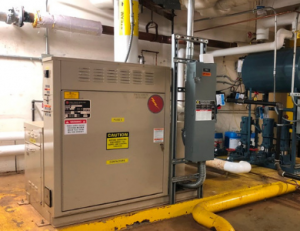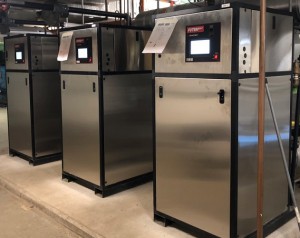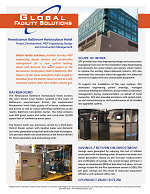Renaissance Baltimore Harborplace Hotel – Case Study
Project Development, MEP Engineering Design
and Construction Management
![]()
Global Facility Solutions provided turn-key MEP engineering design services and construction management for a new central heating, steam and domestic hot water system at the Renaissance Harborplace Hotel in Baltimore, MD. Owners of the iconic waterfront hotel sought to transition from the District Steam service to a self-contained central plant that utilizes natural gas.
Background
The Renaissance Baltimore Harborplace Hotel anchors the city’s famed Inner Harbor. Located in the heart of Baltimore’s entertainment district, the sophisticated Renaissance hotel hosts guests of in-house conferences and events as well as visitors attending conferences at the nearby Baltimore Convention Center. The hotel contains over 600 guest rooms and suites and more than 30,000 square feet of conference event space.
The historic hotel was previously served by a third-party District Steam system with heating water and domestic hot water generated using shell and tube heat exchangers. Low pressure steam was used directly in the hotel’s kitchen for food preparation and dishwashing units.
Project Savings
- $181,750/year operational savings
- Return on Investment (ROI) < 5.0 years
Scope of Work
GFS provided turn-key engineering design and construction management services for the installation of gas-fired heating and domestic hot water boilers and electric steam boilers to replace the existing steam-delivered systems. GFS also developed the necessary electrical upgrades and electrical services to support the new central plant equipment.
 To support the installation of the new systems, GFS created engineering permit drawings, managed contractor bidding and selection, and provided construction management during implementation on behalf of hotel ownership. GFS also provided assistance with system start-up and commissioning to verify performance of all installed and upgraded systems.
To support the installation of the new systems, GFS created engineering permit drawings, managed contractor bidding and selection, and provided construction management during implementation on behalf of hotel ownership. GFS also provided assistance with system start-up and commissioning to verify performance of all installed and upgraded systems.
Savings / Return on Investment
 Savings were generated by reducing the cost of utilities associated with the heating water, domestic hot water and steam generation. Based on the first-year measurement and verification of savings, the overall project will have a return on investment (ROI) of less than 5.0 years. Annual savings to date for the first operational season is $181,750 per year. Savings are the result of improved equipment efficiency and reduced utility rate.
Savings were generated by reducing the cost of utilities associated with the heating water, domestic hot water and steam generation. Based on the first-year measurement and verification of savings, the overall project will have a return on investment (ROI) of less than 5.0 years. Annual savings to date for the first operational season is $181,750 per year. Savings are the result of improved equipment efficiency and reduced utility rate.


